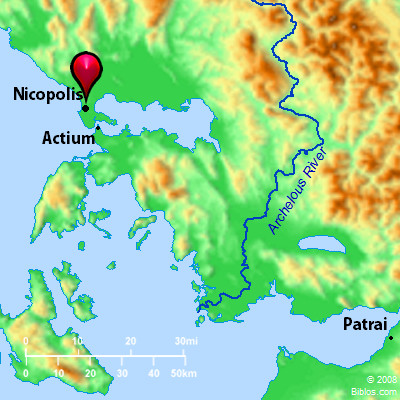Encyclopedia
NICOPOLISni-kop'-o-lis (Nikopolis): A city in Palestine, half-way between Jaffa and Jerusalem, now called Ammas, mentioned in 1 Maccabees 3:40, 57 and 9:50. The earlier city (Emmaus) was burnt by Quintilius Varus, but was rebuilt in 223 A.D. as Nicopolis.
The Nicopolis, however, to which Paul urges Titus to come (pros me eis Nikopolin, ekei gar kekrika paracheimasai (Titus 3:12)) is probably the city of that name situated on the southwest promontory of Epirus. If this view is correct, the statement made by some writers that from Eastern Greece (Athens, Thessalonica, Philippi, Corinth) Paul's labors extended to Italy, that he never visited Western Greece, requires modification. It is true that we do not hear of his preaching at Patras, Zacynthus, Cephallenia, Corcyra (the modern Corfu), which, as a way-station to and from Sicily, always held preeminence among the Ionian islands; but there can be little doubt that, if his plan of going to Nicopolis was carried out, he desired to evangelize the province of Epirus (as well Acarnania) in Western Greece. Indeed, it was in this very city of Nicopolis, probably, that he was arrested and taken to Rome for trial-during one of the winters between 64-67 A.D.
Nicopolis was situated only a few miles North of the modern Prevesa, the chief city of Epirus today, the city which the Greeks bombarded in 1912 in the hope of wresting it from the Turks. The ancient city was founded by Augustus, whose camp happened to be pitched there the night before the famous fight with Antony (31 B.C.). The gulf, called Ambracia in ancient times, is now known as Arta. On the south side was Actium, where the battle was fought. Directly across, only half mile distant, on the northern promontory, was the encampment of Augustus. To commemorate the victory over his antagonist, the Roman emperor built a city on the exact spot where his army had encamped ("Victory City"). On the hill now called Michalitzi, on the site of his own tent, he built a temple to Neptune and instituted games in honor of Apollo, who was supposed to have helped him in the sea-fight. Nicopolis soon became the metropolis of Epirus, with an autonomous constitution, according to Greek custom. But in the time of the emperor Julian (362) the city had fallen into decay, at least in part. It was plundered by the Goths, restored by Justinian, and finally disappeared entirely in the Middle Ages, so far as the records of history show. One document has Nikopolis he nun Prebeza, "Nicopolis, which is now Prebeza." In the time of Augustus, however, Nicopolis was a flourishing town. The emperor concentrated here the population of Aetolia and Acarnania, and made the city a leading member of the Amphictyonic Council. There are considerable ruins of the ancient city, including two theaters, a stadium, an aqueduct, etc.
LITERATURE.
Kuhn, Ueber die Entstehung der staate der Alten.
J. E. Harry
NICOPOLIS, most probably it was in Epirus and now called old Prevesa (pron. pray'vesa), 4 1/2 ms. n. of Prevesa. The latter is a fortified town of 7000 pop. on the n. side of the entrance to the gulf of Arta. The gulf is upon the w. coast of Greece. It is about 180 ms. n.w. by w. from Athens.
Strong's Greek
G3533: Nikopolis"victorious city," Nicopolis, a city in Achaia




